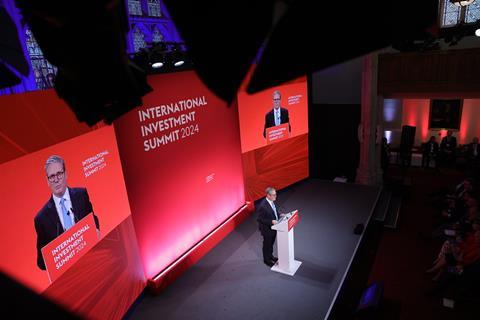Industry leaders have urged the government to spotlight construction as essential to achieving the pledges in its industrial strategy plan unveiled on Monday.
In its Invest 2035 paper, Labour promised to prioritise support across eight key areas: manufacturing; clean energy industries; creative industries; defence; digital and technologies; financial services; life sciences and professional and business services.
While construction was not specifically mentioned, the report also invited recommendations for “subsectors” to be prioritised within the eight broad areas.

Source: Flickr/Number 10
Keir Starmer speaking at this week’s international investment summit in London
Patricia Moore, UK managing director of Turner & Townsend, said construction was “noticeably absent” from the release, despite being the “engine which will deliver and sustain the physical investment that these industries need to thrive”.
She said: “As we digest the strategy and feed into the consultation, we’ll be making the case for how industrial strategy can invest in construction, as well as through construction.”
The chief executive of the Federation of Master Builders, Brian Berry, added: “It is deeply concerning that the chancellor and business secretary have published an Industrial Strategy for the new government, but has not felt it necessary to include reference to the construction sector as an industry for growth, during a period where the UK is experiencing both a housing and skills crisis that are holding back and economic resurgence and threaten long-term market confidence.
“Given the focus on rebuilding Britain, it appears those that will be doing the physical work have been forgotten. The consultation is an opportunity to ensure that construction doesn’t end up as a sideshow sub-sector in the plan. Construction needs to be front and centre in the government’s drive for economic growth.”
Allan Wright, managing director at materials distributor Civils & Lintels said he hoped the “rhetoric” surrounding “housebuilding, civils and infrastructure sectors” that earned Labour its landslide victory at this year’s election “transfers into clear actions”.
He added: “Whilst housebuilding, infrastructure projects and the planning system all commanded significant initial attention, it currently feels that any initial momentum established may have been lost.
“Rachel Reeves’ first budget is, therefore, an excellent opportunity to address these areas and potential options which I’d urge her to consider include, permanent reform to SDLT, the reintroduction of some form of assisted purchase for private home ownership similar to Help to Buy, a significant commitment to invest in the delivery of new rental stock and demonstrable investment in UK infrastructure.”
Richard Beresford, chief executive of the National Federation of Builders (NFB) said the new strategy to be a “fresh approach” that “provides businesses with a platform to further build the planning evidence that past governments have ignored because they feared the vocal minorities opposition to land use”.
He added: “The NFB often cites the planning processes negative impact on skills, investment, meeting climate targets, innovation and social mobility but it has been a hard slog to have that taken seriously and more importantly, actioned.
“As an example, the biggest contractors win many procurement contracts yet do not typically directly employ or use consistent supply chains. In housing, SMEs only build 9% of homes. Is it therefore any wonder that with eight in 10 construction apprentices being trained by SMEs, we have a construction skills crisis?”
>>See also: Government outlines industrial strategy plan as ministers hail £63bn of private funding for projects
RIBA president Muyiwa Oki said: ”The creative industries are a powerhouse for growth, and we are pleased to see this recognised.
“To maximise their potential, the government must facilitate access to a continued pipeline of domestic and international talent, including strengthening the mutual recognition of professional qualifications with the EU.”
And Alasdair Reisner, chief executive at the Civil Engineering Contractors Association, said the government needed to “be clear in its future ambitions and policy”.
“The challenge remains to convert warm policy words into real change on the ground. We would encourage the government to develop a clear partnership with those that are delivering our future infrastructure, to ensure that that there is a single, well-understood change programme that all industry can get behind.”
The plan comes against the backdrop of Labour’s ambitions to build 1.5 million homes over its first five years in power. Executive director of the Home Builders Federation, Steve Turner, said: ”We welcome the joined up approach being taken to remove the barriers to housing delivery including recognition of the need to tackle infrastructure provision and the constraints in essential services and utilities.
”We are also keen to engage on how Skills England can help tackle the challenges industry faces with regards to training provision and funding to ensure we have the workforce necessary to build the homes we need.”

